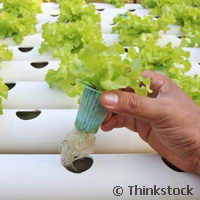EU project pioneers 'remarkable' new approach to food security challenge
An ever-rising global population means that demand for everything from water and land to energy and food is increasing rapidly. However, due a combination of factors, ranging from unsustainable agricultural practices to climate change, our ability to meet such needs is limited. An EU funded project aims to partly address this current pressing challenge by demonstrating the viability of an innovative aquaponics system which allows for virtually emission-free sustainable food production. The four-year INAPRO project (´Innovative model and demonstration based water management for resource efficiency in integrated multitrophic agriculture and aquaculture systems´) will cost some ¿6 million under the EU´s Seventh Framework Programme. It will eventually have four demonstration sites of approx. 500m² in Spain, Belgium, Germany and China and will build on the earlier German ASTAF-PRO project (´Aquaponics system for emission free tomato- and fish production in greenhouses`). The high-tech INAPRO project brings together 18 partners from eight countries and is based at the Leibniz Institute of Freshwater Ecology and Inland Fisheries (IGB) in Berlin where scientists have already developed the ASTAF-PRO technology. Aquaponics, essentially the combination of aquaculture and hydroponics, is all about growing fish and vegetables in an attractive, productive, integrated system. Applications of aquaponics are almost endless as it does not require fertile soil or large water inputs and so can be practiced almost anywhere. Scientists at IGB believe such green technology has the potential to make a ´remarkable´ contribution to future global food security. The new project will try to make aquaponics commercially more viable by modelling, building and testing a concept that, it is hoped, is water and energy efficient, yet able to keep optimum production conditions for both the horticulture and aquaculture part. A European approach is considered vital in the globally emerging aquaponics research field, one which builds on the foundations of Europe's status as a global centre of excellence and technological innovation in the domains of aquaculture and hydroponic horticulture. Prof Werner Kloas, one of the developers, believes ASTAF-PRO offers a 'significantly reduced' water and carbon footprint compared to existing systems, adding, 'We want to prove the economic viability of the system. INAPRO will open new market opportunities for innovative aquaponics, both inside and outside Europe, for producers and technology suppliers from the manufacturing industries as well as for the end-users.' Further comment comes from project coordinator Dr Georg Staaks who said ASTAF-PRO is the technological basis for INAPRO, noting, 'Together with our international, highly qualified and experienced project partners from science and industry we aim to cover the whole value chain from research to market. All stakeholders will have the possibility to experience this innovative technology.' Both agree that this visionary project may pave the way for a more sustainable way of farming food using very few inputs to produce a wide range of healthy and high value foods all year round.For more information, please visit: Project factsheet INAPRO http://www.inapro-project.eu/
Countries
Germany



